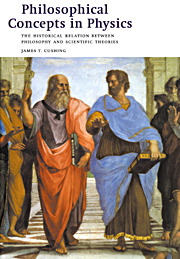 Philosophical Concepts in Physics
Philosophical Concepts in Physics Published online by Cambridge University Press: 05 June 2012
Science, to the ordinary reader of newspapers, is represented by a varying selection of sensational triumphs, such as wireless telegraphy and aeroplanes, radioactivity and the marvels of modern alchemy. It is not of this aspect of science that I wish to speak. Science, in this aspect, consists of detached up-to-date fragments, interesting only until they are replaced by something newer and more up-to-date, displaying nothing of the systems of patiently constructed knowledge out of which, almost as a casual incident, have come the practically useful results which interest the man in the street. The increased command over the forces of nature which is derived from science is undoubtedly an amply sufficient reason for encouraging scientific research, but this reason has been so often urged and is so easily appreciated that other reasons, to my mind quite as important, are apt to be overlooked. It is with these other reasons, especially with the intrinsic value of a scientific habit of mind in forming our outlook on the world, that I shall be concerned in what follows.
The instance of wireless telegraphy will serve to illustrate the difference between the two points of view. Almost all the serious intellectual labour required for the possibility of this invention is due to three men – Faraday, Maxwell, and Hertz. In alternating layers of experiment and theory these three men built up the modern theory of electromagnetism, and demonstrated the identity of light with electromagnetic waves.
To save this book to your Kindle, first ensure [email protected] is added to your Approved Personal Document E-mail List under your Personal Document Settings on the Manage Your Content and Devices page of your Amazon account. Then enter the ‘name’ part of your Kindle email address below. Find out more about saving to your Kindle.
Note you can select to save to either the @free.kindle.com or @kindle.com variations. ‘@free.kindle.com’ emails are free but can only be saved to your device when it is connected to wi-fi. ‘@kindle.com’ emails can be delivered even when you are not connected to wi-fi, but note that service fees apply.
Find out more about the Kindle Personal Document Service.
To save content items to your account, please confirm that you agree to abide by our usage policies. If this is the first time you use this feature, you will be asked to authorise Cambridge Core to connect with your account. Find out more about saving content to Dropbox.
To save content items to your account, please confirm that you agree to abide by our usage policies. If this is the first time you use this feature, you will be asked to authorise Cambridge Core to connect with your account. Find out more about saving content to Google Drive.